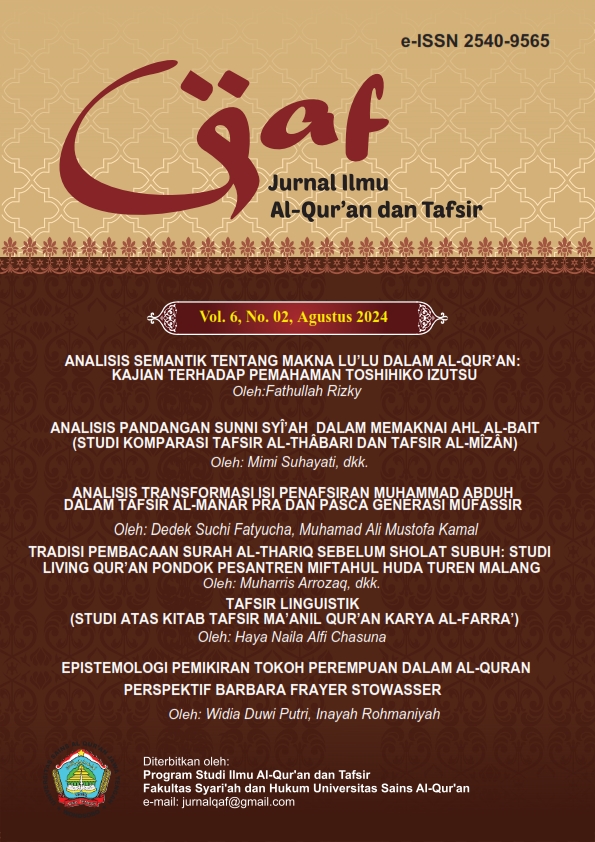Epistemologi Pemikiran Tokoh Perempuan dalam al-Quran Perspektif Barbara Frayer Stowasser
Abstract
Orientalist figures generally focus on studying classical themes far from everyday life's realities. However, it is different with Barbara Freyer Stowasser who raises contemporary gender issues by reconceptualizing the thoughts of female figures in the Qur'an written through her book, Women in the Qur'an, Tradition, and Interpretation. The method used in this research is library research or library study with a qualitative approach and epistemology theory as an analysis knife. This research found that women's freedom and equality with men are what Stowasser highlights in her book. She argues that it is not only the female protagonist who is marked as a role model with her various virtues. More than that, Stowasser highlights the antagonistic female characters in the Quran as symbols of women's freedom in their meanings. Women can determine their life path in any society they live in, provided that they will be responsible for the quality of their decisions.
Downloads
References
Alwi HS, Muhammad. “Epistemologi Tafsir: Mengurai Relasi Filsafat Dengan Al-Qur’an.” Substantia: Jurnal Ilmu-Ilmu Ushuluddin 21, no. 1 (2019): 1. https://doi.org/10.22373/substantia.v21i1.4687.
Andika, Mayola. “Reonterpretasi Ayat Gender Dalam Memahami Relasi Laki-Laki Dan Perempuan (Sebuah Kajian Kontekstual Dalam Penafsiran).” Musawa 17, no. 2 (2018).
Ardiansyah, M. Andik. “Hadis Dalam Pandangan Barbara Stowasser.” Dunia Sejuta Warna. Accessed November 20, 2023. https://duniasejutawarna.blogspot.com/2012/01/hadis-dalam-pandangan-barbara-stowasser.html.
Badruzaman, Dudi. “Perkembangan Paradigma Epistemologi Dalam Filsafat Islam.” Idea: Jurnal Humaniora 2, no. 1 (2019): 52–64.
Balgis, Lilis Fauziah. “Kepemimpinan Perempuan Dalam Al-Quran Perspektif Adil Gender.” Mumtaz Jurnal Studi Islam Dan Keislaman 6, no. 01 (2022): 131–39.
Butar-Butar, N. “Epistemologi Perspektif Barat Dan Islam.” Humantech: Jurnal Ilmiah Multidisiplin Indonesia 1, no. 2 (2021): 240–46. https://journal.ikopin.ac.id/index.php/humantech/article/download/1028/600.
Djamaluddin, Ahdar. “Gender Dalam Perspektif Alqur’an.” Al-Maiyyah 8, no. 1 (2015): 1–15. https://doi.org/10.21831/hum.v18i1.23125.
Dwi Ratnasari. “Gender Dalam Perspektif Alqur’an.” Humanika 1, no. 1 (2018): 1–15.
Halik, Abdul. “Ilmu Pendidikan Islam: Perspektif Ontologi, Epistemologi, Aksiologi.” Istiqra 7, no. 2 (2020).
Maliki, Ahmad. “Menggagas Epistemologi Dalam Filsafat Islam.” At-Thariq: Jurnal Studi Islam Dan Budaya 1, no. 2 (2021): 29–46.
Matswah, A. “Reinterpretasi Ayat-Ayat Tentang Relasi Gender Dalam Keluarga : Analisis Terhadap Penafsiran Edip Yuksel, Dkk.” Suhuf 7, no. 2 (2014): 303–28. https://www.academia.edu/download/58839615/Artikel_Akrimi_Jurnal_Suhuf_Vol_7_2014.pdf.
Muhsin, Amina Wadud. “Women in the Qur’an, Traditions and Interpretation (Book Review).” The American Journal of Islamic Social Sciences 12, no. 2 (1995).
Muir, William. The Coran: Its Composition and Teaching; and The Testimony It Bears to The Holy Sciptures. London: Wyman and Sons, 1878.
Mulyaden, Asep. “Kajian Semiotika Roland Barthes Terhadap Simbol Perempuan Dalam Al-Quran.” Hanafiya: Jurnal Studi Agama-Agama 4, no. 2 (2021).
Nahar, Muhammad Hasnan. “Antagonist Figures in the Qur’anic Stories.” Afkaruna 15, no. 2 (2019): 254–81. https://doi.org/10.18196/aiijis.2019.0105.254-280.
Nasir, Amin. “Keteladanan Perempuan Dalam Sastra Qur’ani: Analisis Kritik Sastra Feminis Kisah Perempuan Dalam Al-Quran.” Palastren 6, no. 2 (2013): 277–98.
Neuwith, Angelika. “Qur’an and History - a Disputed Relationship. Some Reflection on Qur’anic History and History in the Qur’an.” Journal of Qur’anic Studies 5, no. 1 (2023). https://www.euppublishing.com/doi/abs/10.3366/jqs.2003.5.1.1.
Nurani, Shinta. “Al-Quran Dan Penciptaan Perempuan Dalam Tafsir Feminis.” Hermeneutik: Jurnal Ilmu Al-Quran Dan Tafsir 12, no. 1 (2019). https://doi.org/10.1234/hermeneutik.v12i1.6023.
Ryding, Karin Christina. “Barbara Regine Freyer Stowasser 1935–2012.” Review of Middle East Studies, 2012. https://doi.org/10.1017/s2151348100003694.
Salalah, W. “Reinterpretasi Makna Ayat-Ayat Gender Di Dalam Al Qur’an (Studi Terhadap Pemikiran KH. Husein Muhammad),” 2021. http://digilib.uinkhas.ac.id/12976/%0Ahttp://digilib.uinkhas.ac.id/12976/1/Wi’ayatus Salalah_U20171094.pdf.
Sari, Diana, and Kholilur Rohman. “KEDUDUKAN EPISTEMOLOGI DALAM FILSAFAT BARAT.” JAQFI: Jurnal Aqidah Dan Filsafat Islam 5, no. 1 (2020): 35–52.
Sifa, Layyinatus. “Nilai Feminisme Kisah Perempuan Dalam Al-Quran.” Buana Gender 4, no. 1 (2019): 16–38.
Stowasser, Barbara Freyer. Women in the Qur’an, Traditions, and Interpretation. Women in the Qur’an, Traditions, and Interpretation. New York: Oxford University Press, 2011. https://doi.org/10.1093/acprof:oso/9780195111484.001.0001.
Suhra, SAfira. “Kesetaraan Gender Dalam Perspektif Al-Quran Dan Implikasinya Terhadap Hukum Islam.” Al-Ulum 13, no. 2 (2013): 373–94.
Suminar, Tri. “Tinjauan Filsafati (Ontologi, Epistemologi, Dan Aksiologi Manajemen Pembelajaran Berbasis Teori Sibernetik).” Edukasi 13, no. 2 (2019).
Vera, Susanti, and R. Yuli A. Hambali. “Aliran Rasionalisme Dan Empirisme Dalam Kerangka Ilmu Pengetahuan.” Jurnal Penelitian Ilmu Ushuluddin 1, no. 2 (2021): 59–73. https://doi.org/10.15575/jpiu.12207.
Wansbrough, John. Quranic Studies Sources and Methods of Scriptual Interpretation. Oxford: Oxford University Press, 1977.
Zahrani, Hani, Anwar Dhobith, and Rubini. “Kajian Teoritis Epistemologi Pendidikan Islam.” Al-Manar : Jurnal Komunikasi Dan Pendidikan Islam 11, no. 2 (2022): 58–68.




